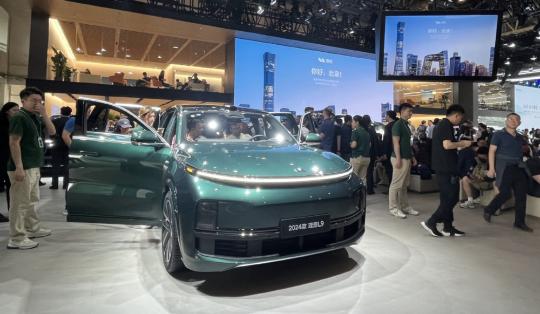Customer demand boosts NEV sector

Li Auto showcases the L9 SUV at the 2024 Beijing auto show in April. (CAO YINGYING/CHINA DAILY)
China's new energy vehicle sales surged in September, with brands including Li Auto and Zeekr seeing record highs, fueling prospects about the sector's robust growth for the last quarter of 2024.
Their wholesales figure was expected to grow 48 percent year-on-year last month to hit 1.23 million units, said the China Passenger Car Association on Wednesday.
Cui Dongshu, secretary-general of the CPCA, said the robust demand for NEVs and their favorable trade-in policies across the country boosted the sector's performance in September, which is also a peak month for vehicle sales in China, together with October.
BYD, China's leading NEV producer, saw a substantial rise in sales thanks to popular models such as the Qin and Song L, sitting atop the list of popular car manufacturers in the country.
The Shenzhen-based carmaker delivered more than 417,600 units last month, soaring 45.6 percent year-on-year. Its focus on affordability and advanced technology has positioned it as a front-runner in the domestic and international markets.
A Sino Auto Insights analyst said BYD's success in combining affordability with innovation is a key reason for its dominance.
"Their ability to produce at scale while maintaining high performance and competitive pricing is keeping them ahead of both domestic and international rivals," he said.
While BYD continues to dominate the mainstream market, premium brands like Zeekr and Nio are making their presence felt in the luxury sector.
Zeekr, a subsidiary of Geely, has built a reputation for high-tech features and sleek designs. Its Zeekr 001 model has been well received in China and abroad, with a focus on tech-savvy consumers looking for cutting-edge electric vehicles.
Last month, Zeekr outperformed Nio to deliver 21,333 units, up 18 percent year-on-year. This brought its sales from January to September to 142,800 units, up 87 percent from the same period last year.
Nio, known for its premium electric SUVs and sedans, also had a strong showing in September, with 21,181 units delivered in the month, up 35.4 percent year-on-year.
Its models, such as the Nio ES6 and ET5, have continued to attract a loyal customer base. The company's focus on user experience, through services such as battery swapping and dedicated Nio Houses, has differentiated it from its competitors.
"Nio is setting itself apart with its customer-focused approach," said an industry expert. "The brand's battery-swapping technology offers consumers a convenience factor that many other automakers have yet to replicate."
Chinese NEV maker Seres sold 37,407 vehicles in September, up 265.09 percent from the same month last year. They brought the company's cumulative sales from January to September this year to 316,713 units, marking a 364.23 percent surge year-on-year.
Chinese automakers are not only dominating the domestic market but are also expanding their footprint internationally. NEVs are at the forefront of the export surge, with brands like BYD and Nio increasing their market share in Europe, Southeast Asia and beyond.
In one of its latest moves, Nio plans to enter the Middle East and North Africa regions, starting with auto deliveries in the United Arab Emirates this quarter.
The Shanghai-based startup said earlier this month that it will establish a research and development center in Abu Dhabi for smart driving and artificial intelligence technologies.
Before the move, Nio has already been active in European nations, including Norway and Germany. Like Nio, Zeekr has been particularly successful in Europe, where demand for high-performance electric vehicles is growing rapidly.
These Chinese companies have been positioning their premium models as an alternative to established European automakers like BMW and Audi, offering a blend of luxury and cutting-edge technology.
Industry analysts remain optimistic about China's vehicle market, particularly in the NEV sector, as they continue to release new models and upgrade existing ones.
In addition, government support for green energy initiatives, such as subsidies for electric vehicle purchases and investments in charging infrastructure, is also expected to continue fueling demand.

